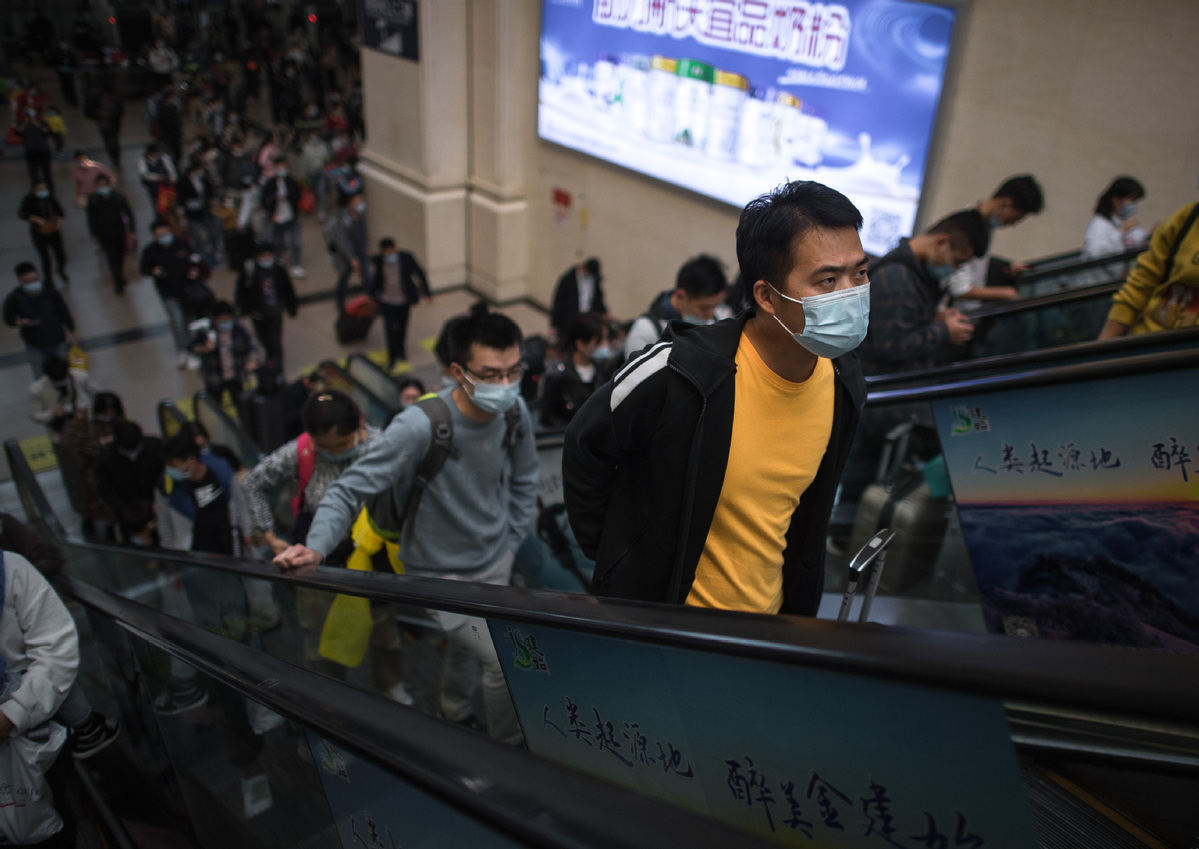
Passengers are seen at the Hankou Railway Station in Wuhan, Hubei province, Oct 8, 2020. [Photo/Xinhua]
Wuhan, capital of Hubei province, is making all-out efforts ranging from upgrading fever clinics to expanding epidemiological investigation forces to cope with any possible COVID-19 outbreaks during the winter, city authorities said on Tuesday.
Health authorities in Wuhan, the city hit hardest by the COVID-19 epidemic in China earlier this year, have renovated fever clinics in 62 hospitals designated for COVID-19 treatment and have started building five infectious disease hospitals as part of efforts to guard against outbreaks this season, Zheng Yun, deputy director of the city's health commission, said at a news conference.
Efforts are also underway to help healthcare institutions improve their ability to conduct nucleic acid testing for the novel coronavirus, and all secondary general hospitals and centers for disease control and prevention in the city will be capable of conducting such tests before the end of the year, he said.
Meanwhile, the city is establishing a professional epidemic prevention and control force comprising 1,000 members, including epidemiologists, testing technicians and virus sterilization workers, to ensure they can live up to their duties in case of an outbreak.
Medical institutions in the city have also expanded reserves of anti-epidemic materials to ensure 30-day supplies of personal protective equipment at each site, Zheng said.
The city's health commission is also conducting pilot monitoring on the flu at 59 major hospitals in the city, and has intensified monitoring and analysis over respiratory infectious diseases prone to spread in winter, he said.
"We will further strengthen epidemic monitoring and early-warning measures, and improve emergency management … to solidify the achievements made in the epidemic fight," Zheng said.
The epidemic has been effectively contained in China since March. No COVID-19 cases were reported in Wuhan on Sunday, according to the city's health commission.
To prevent importation of the virus following the pandemic, city authorities have intensified testing of inbound travelers and of imported cold-chain food such as seafood over the past months, Zheng said.
More than 16,000 employees involved with the production, trading and transportation of frozen seafood in the city have received nucleic acid tests since July 30, and all have tested negative for the novel coronavirus, he said.
Ren Liquan, director of Puai Hospital's department for medical affairs, said the hospital has upgraded 300 quarantine beds, including 30 for severe patients, as part of the contingency plan for possible COVID-19 outbreaks in the winter.
The hospital has also provided training on COVID-19 screening and diagnosis to 221 doctors, nurses and management staff members, he said.
Hu Yi, deputy director of Wuhan's market regulation administration, said all 318 wholesale food markets in Wuhan have been upgraded to meet epidemic control and prevention standards and reopened.
All these markets have carried out epidemic control and prevention measures, including demanding all people wear masks and receive body temperature checks before entering, and frequent sterilization has also been applied in the markets, he said.
Wholesale food markets in many areas in China contain wet areas where fresh meat and aquatic products are sold, which make them more susceptible to viral transmission. Strict epidemic prevention and control measures have been applied at such markets nationwide following COVID-19 outbreaks.
(China Daily)







